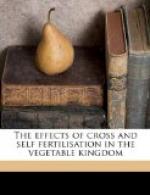The conclusion that the advantages of a cross depend altogether on the differentiation of the sexual elements, harmonises perfectly with the fact that an occasional and slight change in the conditions of life is beneficial to all plants and animals. (12/13. I have given sufficient evidence on this head in my ‘Variation under Domestication’ chapter 18 volume 2 2nd edition page 127.) But the offspring from a cross between organisms which have been exposed to different conditions, profit in an incomparably higher degree than do young or old beings from a mere change in the conditions. In this latter case we never see anything like the effect which generally follows from a cross with another individual, especially from a cross with a fresh stock. This might, perhaps, have been expected, for the blending together of the sexual elements of two differentiated beings will affect the whole constitution at a very early period of life, whilst the organisation is highly flexible. We have, moreover, reason to believe that changed conditions generally act differently on the several parts or organs of the same individual (12/14. See, for instance, Brackenridge ‘Theory of Diathesis’ Edinburgh 1869.); and if we may further believe that these now slightly differentiated parts react on one another, the harmony between the beneficial effects on the individual due to changed conditions, and those due to the interaction of differentiated sexual elements, becomes still closer.
That wonderfully accurate observer, Sprengel, who first showed how important a part insects play in the fertilisation of flowers, called his book ‘The Secret of Nature Displayed;’ yet he only occasionally saw that the object for which so many curious and beautiful adaptations have been acquired, was the cross-fertilisation of distinct plants; and he knew nothing of the benefits which the offspring thus receive in growth, vigour, and fertility. But the veil of secrecy is as yet far from lifted; nor will it be, until we can say why it is beneficial that the sexual elements should be differentiated to a certain extent, and why, if the differentiation be carried still further, injury follows. It is an extraordinary fact that with many species, flowers fertilised with their own pollen are either absolutely or in some degree sterile; if fertilised with pollen from another flower on the same plant, they are sometimes, though rarely, a little more fertile; if fertilised with pollen from another individual or variety of the same species, they are fully fertile; but if with pollen from a distinct species, they are sterile in all possible degrees, until utter sterility is reached. We thus have a long series with absolute sterility at the two ends;—at one end due to the sexual elements not having been sufficiently differentiated, and at the other end to their having been differentiated in too great a degree, or in some peculiar manner.




